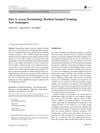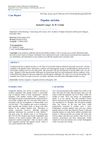 44 citations,
November 2011 in “The Journal of Dermatology”
44 citations,
November 2011 in “The Journal of Dermatology” New understanding of the causes of primary cicatricial alopecia has led to better diagnosis and potential new treatments.
 38 citations,
September 2017 in “Oncologist”
38 citations,
September 2017 in “Oncologist” Scalp cooling can help prevent chemotherapy-induced hair loss with a 50-90% success rate and is safe for patients.
 38 citations,
February 2016 in “Surgery Journal”
38 citations,
February 2016 in “Surgery Journal” Facial plastic surgery has evolved to focus on less invasive techniques and innovative technologies for cosmetic and reconstructive procedures.
[object Object]  27 citations,
January 2001 in “Endocrine Practice”
27 citations,
January 2001 in “Endocrine Practice” Finasteride cream reduces hair growth in women with hirsutism, but more research needed.
 22 citations,
January 2015 in “Dermatology Research and Practice”
22 citations,
January 2015 in “Dermatology Research and Practice” An extra-strength marine protein supplement helped increase hair growth and decrease hair shedding in women with thinning hair.
 22 citations,
August 2011 in “Endocrine Practice”
22 citations,
August 2011 in “Endocrine Practice” Most hirsutism cases are due to PCOS, and treatment focuses on lowering testosterone and blocking its effects.
 17 citations,
October 2015 in “Medicine and Pharmacy Reports”
17 citations,
October 2015 in “Medicine and Pharmacy Reports” Animal models are crucial for learning about hair loss and finding treatments.
 15 citations,
February 2019 in “Internal Medicine Journal”
15 citations,
February 2019 in “Internal Medicine Journal” Australian doctors experienced in adult transgender healthcare mostly prescribe intramuscular testosterone and oral estradiol, recommend mental health assessments before hormone therapy, and support improved training and guidelines.
 15 citations,
May 2013 in “American Journal of Medical Genetics - Part A”
15 citations,
May 2013 in “American Journal of Medical Genetics - Part A” People with X-linked hypohidrotic ectodermal dysplasia have no sweat ducts and less, thinner hair.
 14 citations,
February 2020 in “Stem Cells International”
14 citations,
February 2020 in “Stem Cells International” Umbilical cord cells safely improve healing in long-term nonhealing wounds better than a placebo.
 12 citations,
October 2017 in “Journal of Cosmetic Dermatology”
12 citations,
October 2017 in “Journal of Cosmetic Dermatology” Combining plasma rich in growth factors with hair transplant surgery may lead to faster recovery and better outcomes for hair loss treatment.
 11 citations,
October 2001 in “Dermatologic Clinics”
11 citations,
October 2001 in “Dermatologic Clinics” The document concludes that DAB389-IL2 is promising for treating refractory cutaneous T-cell lymphoma, but more research is needed on its effectiveness and side effect management.
 9 citations,
May 2021 in “Dermatologic Therapy”
9 citations,
May 2021 in “Dermatologic Therapy” Possible link between androgens and COVID-19 severity; more research needed.
 4 citations,
August 2018 in “JEADV. Journal of the European Academy of Dermatology and Venereology/Journal of the European Academy of Dermatology and Venereology”
4 citations,
August 2018 in “JEADV. Journal of the European Academy of Dermatology and Venereology/Journal of the European Academy of Dermatology and Venereology” There is an urgent need for better treatments for hair loss caused by chemotherapy.
 3 citations,
January 2012 in “Elsevier eBooks”
3 citations,
January 2012 in “Elsevier eBooks” Burn scars form abnormally due to changes in wound healing, and more research is needed to improve treatments.
 2 citations,
May 2001 in “Current problems in dermatology”
2 citations,
May 2001 in “Current problems in dermatology” The conclusion is that effectively treating hair disorders is difficult due to the complex factors affecting hair growth and more research is needed to improve treatments.
 1 citations,
January 2020 in “Elsevier eBooks”
1 citations,
January 2020 in “Elsevier eBooks” Hormone therapy is safe and effective for transgender adults, but requires regular monitoring and mental health support.
 1 citations,
January 2018 in “Recent clinical techniques, results, and research in wounds”
1 citations,
January 2018 in “Recent clinical techniques, results, and research in wounds” Using developmental signaling pathways could improve adult wound healing by mimicking scarless embryonic healing.
 1 citations,
May 2016 in “Current Opinion in Pediatrics”
1 citations,
May 2016 in “Current Opinion in Pediatrics” Children's hair loss can be caused by various factors and should be treated with appropriate, age-specific methods and psychological support.
 1 citations,
March 2016 in “Current Dermatology Reports”
1 citations,
March 2016 in “Current Dermatology Reports” New evaluation tools are needed for better surgical training in dermatology residency programs.
[object Object]  1 citations,
August 2013 in “Springer eBooks”
1 citations,
August 2013 in “Springer eBooks” Birth control pills and anti-androgen medications help manage hair growth, acne, and hair loss in women with PCOS.
 1 citations,
February 2012 in “The American Journal of Cosmetic Surgery”
1 citations,
February 2012 in “The American Journal of Cosmetic Surgery” UBM helps hair regrowth in men and women with hair loss.
 December 2024 in “Research Square (Research Square)”
December 2024 in “Research Square (Research Square)” Placental stem cell exosome therapy improves hair growth and reduces hair loss.
 December 2023 in “International journal of multidisciplinary research and analysis”
December 2023 in “International journal of multidisciplinary research and analysis” SH-MSCs gel can effectively treat alopecia by increasing IL-10 and decreasing TNF-α gene expression.
 October 2023 in “European medical journal. Dermatology”
October 2023 in “European medical journal. Dermatology” Hair loss greatly affects quality of life, and dermatologists are crucial for proper diagnosis and treatment.
 June 2023 in “NILES Journal forGeriatric and Gerontology/NILES Journal for Geriatric and Gerontology”
June 2023 in “NILES Journal forGeriatric and Gerontology/NILES Journal for Geriatric and Gerontology” Oral tranexamic acid is a safe and effective treatment for melasma.
 April 2020 in “International journal of research in dermatology”
April 2020 in “International journal of research in dermatology” An 8-year-old girl has a rare, irreversible hair loss condition caused by a genetic mutation.
 January 2019 in “Georg Thieme Verlag eBooks”
January 2019 in “Georg Thieme Verlag eBooks” Platelet-Rich Plasma (PRP) therapy can effectively treat various hair loss conditions, improve hair count, thickness, and density, and potentially speed up results when combined with surgical techniques.

No treatment alters the natural progression of alopecia areata, and effectiveness varies, with some possibly working better in children.

Hair loss in African American women, caused by hair care, genetics, and environment, needs more research for better treatment.






























